As regular visitors here know, my special project for 2013 was to reread works from 12 Canadian authors who had influenced me in my youth (a project that will extend into 2014 with two reviews yet to come). That produced an even more “Canadian” slant than usual to my reading this year — reflected in the fact that five of these 10 are the work of Canadian authors.
Still, the very subjective list has some variety: three titles from my project, two Giller contenders, two Booker Prize shortlisted books and three “others” that impressed me very much. My Canadian project meant less reading of true classics from around the world in 2013 — I intend to remedy that shortfall in 2014. The list, presented in the order that I read them:
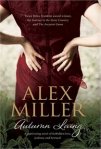 Autumn Laing, by Alex Miller. Autumn Laing is Australian Alex Miller’s tenth novel (he has just released his eleventh) but it was my first — I was impressed enough with it that I have decided to read the preceding nine in order (a review of his first, Watching the Climbers on the Mountain, was posted just a few weeks back). This one is a memory novel — Autumn Laing is 85 when we meet her but a recent chance encounter has put her in mind of a grievous harm she did another woman 53 years back. She “stole” that woman’s man and it eventually led to a comfortable life with a wealthy husband where they turned their home into an Austalian version of a Bloomsbury-like retreat for creative types. The encounter has provoked major memories of regret — the novel that results is not just a portrayal of the artistic way of life, it captures a picture of post-colonial Australia trying to find its own non-British character.
Autumn Laing, by Alex Miller. Autumn Laing is Australian Alex Miller’s tenth novel (he has just released his eleventh) but it was my first — I was impressed enough with it that I have decided to read the preceding nine in order (a review of his first, Watching the Climbers on the Mountain, was posted just a few weeks back). This one is a memory novel — Autumn Laing is 85 when we meet her but a recent chance encounter has put her in mind of a grievous harm she did another woman 53 years back. She “stole” that woman’s man and it eventually led to a comfortable life with a wealthy husband where they turned their home into an Austalian version of a Bloomsbury-like retreat for creative types. The encounter has provoked major memories of regret — the novel that results is not just a portrayal of the artistic way of life, it captures a picture of post-colonial Australia trying to find its own non-British character.
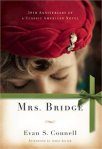 Mrs. Bridge, by Evan Connell. Mrs. Bridge is one of those novels that has been around for more than half a century but is experiencing a bit of a revival — and virtually every blogger who reads it ends up adding it to their annual top 10 list (I have John Self’s review at the Asylum to thank for sparking my interest). India Bridge is one of those passive female characters of mid-west America in the 1930s (a precursor of Morag Gunn in Margaret Laurence’s The Diviners, also on this list) who starts a lot of “projects” and finishes none. Risk averse as she might be, Mrs. Bridge’s comfortable, country club life starts to run into crisis after crisis, none of which she handles well — but in the final analysis Connell creates a character who inspires both sympathy and love, a tribute to a writer’s job exceedingly well done.
Mrs. Bridge, by Evan Connell. Mrs. Bridge is one of those novels that has been around for more than half a century but is experiencing a bit of a revival — and virtually every blogger who reads it ends up adding it to their annual top 10 list (I have John Self’s review at the Asylum to thank for sparking my interest). India Bridge is one of those passive female characters of mid-west America in the 1930s (a precursor of Morag Gunn in Margaret Laurence’s The Diviners, also on this list) who starts a lot of “projects” and finishes none. Risk averse as she might be, Mrs. Bridge’s comfortable, country club life starts to run into crisis after crisis, none of which she handles well — but in the final analysis Connell creates a character who inspires both sympathy and love, a tribute to a writer’s job exceedingly well done.
 The Dinner, by Herman Koch. The Dinner, translated from the Dutch, is on a lot of North American 2013 best lists and for good reason. The first half of Koch’s novel is laugh-out-loud funny as two Dutch couples (the two men are brothers who don’t much like each other) experience the pretentiousness of an “in” restaurant. Behind that satiric humor, however, the author is setting the stage for the latter half of his story — all of these four are developed as very dislikable people and, as dinner proceeds, they descend into a no-win conflict over a criminal incident involving their two sons. There are no winners in this novel — except for the reader.
The Dinner, by Herman Koch. The Dinner, translated from the Dutch, is on a lot of North American 2013 best lists and for good reason. The first half of Koch’s novel is laugh-out-loud funny as two Dutch couples (the two men are brothers who don’t much like each other) experience the pretentiousness of an “in” restaurant. Behind that satiric humor, however, the author is setting the stage for the latter half of his story — all of these four are developed as very dislikable people and, as dinner proceeds, they descend into a no-win conflict over a criminal incident involving their two sons. There are no winners in this novel — except for the reader.
 The Diviners, by Margaret Laurence. The last of Margaret Laurence’s “Manawaka” novels, this is another “writer’s” novel — Morag Gunn is a successful author approaching her fiftieth birthday looking back at just how she got to where she is. That story starts in Manawaka and moves on to Toronto and Vancouver, before ending up at the Ontario riverside where she now lives. Published in 1974, The Diviners is not just the story of mid-twentieth century Canada it is a study of the challenges that faced creative women during the post-war years in North America — a true classic, well worth revisiting.
The Diviners, by Margaret Laurence. The last of Margaret Laurence’s “Manawaka” novels, this is another “writer’s” novel — Morag Gunn is a successful author approaching her fiftieth birthday looking back at just how she got to where she is. That story starts in Manawaka and moves on to Toronto and Vancouver, before ending up at the Ontario riverside where she now lives. Published in 1974, The Diviners is not just the story of mid-twentieth century Canada it is a study of the challenges that faced creative women during the post-war years in North America — a true classic, well worth revisiting.
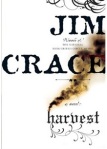 Harvest, by Jim Crace. My personal choice (but not the jury’s) as this years Booker Prize winner, this morality tale set in a feudal English settlement of 58 weary souls contains allegories galore. The community is under threat from two sources: the new master (a distant relative of the one the community has become used to) wants to turn the area into a sheep farm which will have work for far fewer people while at the same time the arrival on its outskirts by three strangers claiming land has provoked a different set of concerns. Without giving too much away, the final third of the novel is a study in isolation and loneliness — the allegory of the loneliness that comes with being a writer was the one that struck me most strongly as Crace had announced before publication that this would be his last work.
Harvest, by Jim Crace. My personal choice (but not the jury’s) as this years Booker Prize winner, this morality tale set in a feudal English settlement of 58 weary souls contains allegories galore. The community is under threat from two sources: the new master (a distant relative of the one the community has become used to) wants to turn the area into a sheep farm which will have work for far fewer people while at the same time the arrival on its outskirts by three strangers claiming land has provoked a different set of concerns. Without giving too much away, the final third of the novel is a study in isolation and loneliness — the allegory of the loneliness that comes with being a writer was the one that struck me most strongly as Crace had announced before publication that this would be his last work.
 The Spinning Heart, by Donal Ryan. This little gem of a novel is one of those rare ones that has become progressively more memorable in the months since I read it. In a slim 156 pages, Ryan uses 21 chapters, each sketching the story of an individual in an Irish village — one dramatically effected by a corrupt contractor who has built one of the country’s “ghost estates” on the outskirts of town. While there are both heroes and villains in the group, what emerges more than anything else is a mosaic-like picture of a community of very ordinary people struggling to find its place in the twenty-first century. Word is that Ryan has a second book coming out in 2014 (apparently written at the same time he was penning this debut) — I can’t wait for its appearance.
The Spinning Heart, by Donal Ryan. This little gem of a novel is one of those rare ones that has become progressively more memorable in the months since I read it. In a slim 156 pages, Ryan uses 21 chapters, each sketching the story of an individual in an Irish village — one dramatically effected by a corrupt contractor who has built one of the country’s “ghost estates” on the outskirts of town. While there are both heroes and villains in the group, what emerges more than anything else is a mosaic-like picture of a community of very ordinary people struggling to find its place in the twenty-first century. Word is that Ryan has a second book coming out in 2014 (apparently written at the same time he was penning this debut) — I can’t wait for its appearance.
 The Crooked Maid, by Dan Valeta. In his Acknowledgements at the end of The Crooked Maid Dan Valeta says “I wanted to write a world, not a book” — and for this reader he succeeded in doing just that. That world is post-war Vienna, struggling to escape the corrupt moral code of Nazism, but still searching for just what the new peacetime version might be. The novel opens by introducing characters who are coming to post-war Vienna because of (perhaps) a missing husband, a suspicious death (perhaps murder) and the crooked maid of the title (we aren’t sure just what her “perhaps” history is). Valeta successfully sustains all those story lines but his greater interest is in the “world” of a famous city that is in the midst of a change that none of its residents quite yet understand.
The Crooked Maid, by Dan Valeta. In his Acknowledgements at the end of The Crooked Maid Dan Valeta says “I wanted to write a world, not a book” — and for this reader he succeeded in doing just that. That world is post-war Vienna, struggling to escape the corrupt moral code of Nazism, but still searching for just what the new peacetime version might be. The novel opens by introducing characters who are coming to post-war Vienna because of (perhaps) a missing husband, a suspicious death (perhaps murder) and the crooked maid of the title (we aren’t sure just what her “perhaps” history is). Valeta successfully sustains all those story lines but his greater interest is in the “world” of a famous city that is in the midst of a change that none of its residents quite yet understand.
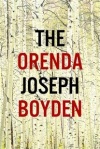 The Orenda, by Joseph Boyden. If I was forced to pick a single “best book of 2013” instead of 10, this would be the one — when the Real Giller jury left it off the short list, our Shadow Giller panel called in The Orenda and it was our unanimous choice as the winner. Boyden’s novel comes with three voices: A Huron elder, a young Iroquois girl he has taken as hostage to be a replacement for his daughter killed in a previous battle and a Jesuit priest who is the forerunner of the European invasion that is to come. The conflicts between First Nations tribes are described in painful, gruesome detail — the developing and even more damaging conflict between the aboriginal people and European invaders looms as a picture of the future. It is not the easiest novel to read, but it is a truly brilliant one.
The Orenda, by Joseph Boyden. If I was forced to pick a single “best book of 2013” instead of 10, this would be the one — when the Real Giller jury left it off the short list, our Shadow Giller panel called in The Orenda and it was our unanimous choice as the winner. Boyden’s novel comes with three voices: A Huron elder, a young Iroquois girl he has taken as hostage to be a replacement for his daughter killed in a previous battle and a Jesuit priest who is the forerunner of the European invasion that is to come. The conflicts between First Nations tribes are described in painful, gruesome detail — the developing and even more damaging conflict between the aboriginal people and European invaders looms as a picture of the future. It is not the easiest novel to read, but it is a truly brilliant one.
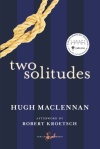 Two Solitudes, by Hugh MacLennan. The political conflict between English and French visions of Canada has been a constant presence in my adult life — in this novel written in 1945, Hugh MacLennan supplies a picture of that conflict that is relevant to this day. The character we first meet, Athanese Tallard, is a virtual seigneur in a small village east of Montreal — he is also an MP in Ottawa who has an understanding that the two cultures need to be bridged. A retired Nova Scotia seafarer, a priest determined to protect his power, financial heavyweights from the Montreal English community and the next generation (who already are experiencing the conflict) all play a part in this wide-ranging novel that well deserves its fame.
Two Solitudes, by Hugh MacLennan. The political conflict between English and French visions of Canada has been a constant presence in my adult life — in this novel written in 1945, Hugh MacLennan supplies a picture of that conflict that is relevant to this day. The character we first meet, Athanese Tallard, is a virtual seigneur in a small village east of Montreal — he is also an MP in Ottawa who has an understanding that the two cultures need to be bridged. A retired Nova Scotia seafarer, a priest determined to protect his power, financial heavyweights from the Montreal English community and the next generation (who already are experiencing the conflict) all play a part in this wide-ranging novel that well deserves its fame.
 Island: The Collected Stories, by Alistair MacLeod. For this reader, Alistair MacLeod rivals Nobel Prize winner Alice Munro in his ability to show what just how good a short story can be. Island includes all 16 of his published stories — he brings Canada’s Cape Breton Island to concrete life (both the highs and lows) and painstakingly creates characters who are fully realized in every story. The book is a special treat that deserves to be spaced out and carefully savoured in the reading.
Island: The Collected Stories, by Alistair MacLeod. For this reader, Alistair MacLeod rivals Nobel Prize winner Alice Munro in his ability to show what just how good a short story can be. Island includes all 16 of his published stories — he brings Canada’s Cape Breton Island to concrete life (both the highs and lows) and painstakingly creates characters who are fully realized in every story. The book is a special treat that deserves to be spaced out and carefully savoured in the reading.
As for 2014, those of us who follow prizes have two developments to look forward to already. The Folio Prize will announce its first shortlist in February from a longlist of 80 (60 English-language novels chosen from favorites submitted by the Folio panel of more than 100 authors and critics from around the world, 20 more called in by the five-person international jury). I’ll decide whether to try to read and review the whole shortlist once it is announced. And the Booker Prize is now “the old Booker” in name only, no longer restricted to authors with Commonwealth citizenship but open to any novel published in English in the United Kingdom. I’ve always tried to review as many Booker longlist titles as possible — we shall see in July when the longlist is announced whether that is still a viable goal.
December 23, 2013 at 4:15 pm |
Thanks for the list Kevin. I loved THE DINNER, and have The Spinning Heart here to read. Also bought Autumn Laing on your rec.
BTW Have you seen Wentworth Prison?
LikeLike
December 23, 2013 at 8:01 pm |
Those are three quite different books — but all are rewarding reads.
I haven’t heard of Wentworth Prison — will check it out.
LikeLike
December 23, 2013 at 6:32 pm |
Wow. Great List. I’m with you on The Orenda!
LikeLike
December 23, 2013 at 8:02 pm |
I’m glad you liked the list. And we have volume three in Boyden’s trilogy to look forward to — soon, I hope.
LikeLike
December 24, 2013 at 8:44 am |
Yes, I’m looking forward to that!
LikeLike
December 23, 2013 at 11:47 pm |
Wentworth prison is based on an Aussie series that ran in the late 70s for 8 years. Wentworth Prison is the remake. Very entertaining & well acted and can’t wait for season 2. The last episode in the series didn’t end quite the way I wanted it to (no spoilers) but I’m in for the rest.
LikeLike
December 24, 2013 at 9:36 am |
Are you talking about “Prisoner” (known in UK as “Cell Block H”)? A heavy duty soap opera set in a women’s prison? If so, I’m flabbergasted anyone would want to remake that.
LikeLike
December 31, 2013 at 12:14 pm |
yes it’s the remake. I looked over the original (there’s a whole website devoted to it) and I’m not interested in the original.
LikeLike
December 24, 2013 at 9:39 am |
From what I can tell, that is the show (and remake) that Guy is talking about.
LikeLike
December 24, 2013 at 6:40 am |
A great list, Kevin – a few I’ve read (Miller, Crace, Vyleta), a few I have copies of (Boyden, Ryan, MacLeod) and three which your reviews have made me want to read (Connell, Laurence, MacLennan). I’m thrilled that you’re enjoying Alex Miller’s books so much – having read eight of his books now, he is definitely a favourite author of mine.
I haven’t thought about my own ‘top ten’ of 2013 yet as there is still time to fit in another couple of books. However, there are two novels which stand – for me – head and shoulders above anything else I’ve read this year: Ernest Buckler’s ‘The Mountain and the Valley’ and Larry McMurtry’s ‘Lonesome Dove’.
LikeLike
December 24, 2013 at 8:00 am |
I’ve seen your high rating of Buckler — and confess that I did not consider it when I put together m 2013 project list. I did read it as a youth but it did not stay with me the way the ones that I did choose did, although part of that is probably that Buckler wrote only one other novel as far as I can tell.
Currently it is boxed away until our basement woes are sorted out. I plan to read it as a kind of “coda” to my project when I’ve finished reviewing the final two volumes.
I’ll be very interested in your reaction to MacLeod when you get to his stories, because you read more collections than anyone else I am aware of. I am wondering if as a reader one has to know something about Cape Breton (even just a little bit) for them to have the impact that they obviously have on me.
LikeLike
December 24, 2013 at 9:18 am |
I’ve had a copy of MacLeod’s ‘Island’ for years so it really is time I got around to it – I read ‘No Great Mischief’ back in 2000 and remember thinking it very good, though the setting was a bit lost on me, so you might have a valid point there.
Buckler’s book – aside from being beautifully written – just really resonated with me personally. I’m sure it wouldn’t have the same impact for every reader, but the way he writes about David Canaan’s largely solitary existence and his realisation that life and many of its opportunities have almost passed him by really struck a chord with me. I think Buckler also wrote short stories and I’d love to try those at some point.
I’ve seen ‘The Mountain and the Valley’ compared a couple of times to Charles Bruce’s ‘The Channel Shore’ (have you read that?) which was written around the same time, so that is a novel I definitely plan to get to next year.
LikeLike
December 24, 2013 at 9:38 am |
I suspect the reason The Mountain and the Valley did not stay with me was that I was simply too young to really appreciate it when I read it. It probably has a lot more to say to me now.
And I have not heard of The Channel Shore (or Charles Bruce, who seems to have published more poetry than fiction). I’ll admit I am stronger on Western regional authors than I am on Maritime ones.
LikeLike
December 24, 2013 at 9:43 am |
A great list, Kevin. The Orenda is on mine (surprise, surprise). And while I read and loved both Mrs Bridge and The Crooked Maid there were other books I felt more worthy of inclusion on my list. I’m afraid I must be the only person in the world who didn’t “get” The Spinning Heart, but maybe I just read it at the wrong time. Thanks for the reminder about The Dinner; I’ve had it in my TBR for a year now. I must dig it out to read in 2014.
LikeLike
December 24, 2013 at 9:54 am |
I’ve been aware that The Spinning Heart did not work for you and a little surprised by that — given your affection for Irish fiction, I would have predicted that it would strike a responsive chord. I actually was somewhat ambivalent about it when I first read it, but some of the stories have become more vivid in memory since then.
LikeLike
January 6, 2014 at 2:40 am |
A late comment Kevin: happy new year to you (and Mrs KfC) and thanks for another year of expanding my reading horizons.
I will definitely get The Orenda at some stage, and having been sceptical I must admit you are starting to sell me on Donal Ryan.
LikeLike
January 6, 2014 at 8:07 am |
Happy New Year to you as well. I see the new Ryan is out (sorry, title is not at hand) and I look forward to it. From advance material I have read, it promises to deal with modern-day, post-Celtic-Tiger Ireland, but appears to be structured in a more conventional fashion.
LikeLike
January 14, 2014 at 9:56 am |
I’m late to the party, Kevin – something has gone wrong with my feeds (maybe I mucked something up when I got my new laptop). Anyway, I love the list, a mixture of some I’ve already got and others to add to my wishlist:)
Happy New Year to you and Mrs KfC:)
LikeLike
January 14, 2014 at 9:58 am |
Thanks for bringing the list back to the top of the comments pile. Good luck with any additions to your wish list.
LikeLike
April 16, 2014 at 10:20 am |
I’m hugely looking forward to Mrs. Bridge and Harvest. I hadn’t expected somehow though to see the Ryan on your list, and seeing it there makes me wonder if I should reconsider it (I had mentally crossed it off my TBR for some reason I can’t now recall). That’s part of the point of these lists though I suppose, to remind people of books they may have missed, forgotten or wrongly taken against.
On the topic of missed books, I’d completely missed your review of The Crooked Maid, which looks very interesting.
The Orenda hadn’t tempted me, but I note how highly you praise it so I’ll take another look.
Apologies for the test post. I’m not sure why but a few times I’ve posted comments and they’ve vanished even though they seemed accepted – I’m not sure if it’s a wordpress bug or what but it’s meant I’ve been commenting less as I write stuff out but then lose it and can’t find a way for it to keep. Clearly it’s not affecting everyone which makes it even harder to diagnose. Frustrating.
LikeLike
April 16, 2014 at 11:48 am |
I’ve eliminated the test post, so apologies if I confuse anyone. I haven’t heard of anyone else having problems, although I know on occasion I have posted comments to other WordPress blogs and they seem to park themselves in the ether for a few minutes.
Mrs. Bridge and Harvest remain strong in memory — as does The Crooked Maid, which I think would suit your tastes. I suspect The Orenda might be somewhat Canadian-specific for you — I certainly found that my own knowledge of the history (and geography) was useful in appreciating the novel. Boyden’s a very good writer but I think you might find it better to start with the opening volume of his project trilogy, Three Day Road (a double review of that and book two, Through Black Spruces, is here).
LikeLike
April 17, 2014 at 4:12 am |
Perhaps I got spamfiltered? I wrote a fairly long reply under the Kushner which never appeared, and there were a couple of other times. Well, hopefully it was some random wordpress bug and it’s now fixed.
Thanks for the tip re Boyden. I’ll check out that Three Day Road link.
LikeLike